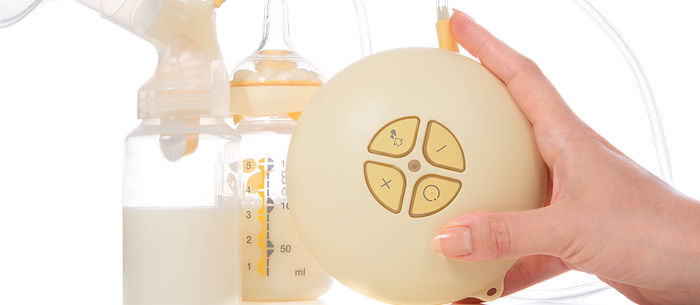Whether you’re expecting a baby or have a new one, you might have some questions about breast pumps and what kind you really need. There are so many choices it’s positively dizzying. You may have seen references to hospital-grade breast pumps but also pumps that are referred to as “personal grade.” So what’s the real deal on your options?
What Is a Hospital-Grade Breast Pump?
Breast pumps are considered medical devices by the U.S. Food and Drug Administration, yet the organization doesn’t recognize the term hospital-grade breast pump. The FDA only cites multiple- and single-user pumps, so there is confusion about what hospital-grade really means. “A hospital-grade breast pump is a multiple-user breast pump,” explains Tina Conner, a board-certified lactation consultant and NICU nurse. “It has a closed system and is safe for moms to share.”
Hospitals use these devices because of their closed systems. Whereas open systems are meant for only one user, as they don’t have a way of filtering out milk, sweat and other bodily fluids that may make their way into the device, closed systems have tools in place to eliminate this risk. Breast pumps are considered “closed-system pumps” when they have certain barriers in place that prevent milk from getting into the motor (and then possibly back out to other users’ milk), explains Dot Norcross, an international board-certified lactation consultant and the founder of Lactation Care, Inc.
Why Use a Hospital-Grade Pump?
You may be drawn to a hospital-grade pump due to the ease of use. These devices are typically more powerful than their single-user counterparts, and as a result they require a shorter pumping time. This type of pump also may provide a quieter experience that’s more comfortable for both mom and baby.
Some women need hospital-grade breast pumps for medical reasons. Their babies could have trouble latching on or encounter other health issues that make it impossible to pump naturally, and a heavy-duty pump ensures that moms can pump quickly and efficiently. On the other hand, moms may have their own health hiccups that prevent breastfeeding. If they don’t have an established milk supply, for example, a hospital-grade pump could be what they need to get enough milk for their babies.
These pumps are typically available for rent and often have same-day service if you have a mechanical issue. Depending on the length of time for which you need to rent them, the total cost of temporary ownership may be less than buying a single-user device outright.
What Are the Drawbacks of the Breast Pump?
There are a few disadvantages associated with hospital-grade pumps. Because they are usually larger and heavier than personal pumps, they are not very portable. This could be difficult for working moms. And if you plan on purchasing one outright or renting for an extended period of time, expenses may rise, making it tough to fit the pump into your already strained baby budget. Renting a breast pump also requires some effort on your part to ensure all parts are included in the kit, sterilized and working properly.
Moms should be aware of the risks of renting. Because there is no recognized FDA definition for hospital-grade pumps, retailers may have varying levels of quality. The FDA recommends asking for references from your doctor when searching for a rental provider and verifying that the supplier is reputable with the help of the Better Business Bureau. Even if renting sounds like a great idea, you’ll have to make sure it fits in your budget and insurance plan, which could be more difficult than you think. “A related issue is the fact that fewer insurers are covering a hospital-grade benefit since the enactment of the ACA (Affordable Care Act),” says Norcross, and not everyone who qualifies is aware that their insurance might cover it. The cost may be different for each person, so your best option is to contact your insurance provider directly to determine the details of your coverage. You can also discuss breast pumps with your doctor to figure out your personal needs and next steps.
Laura Richards is a Boston-based freelance writer and the mother of four boys including a set of identical twins. She has written for numerous parenting publications and is the President of On Point Communications. Her parenting links can be found on her Modern Mothering website.
* This article is for general informational purposes only. It is not intended nor implied to be providing medical advice and is not a substitute for such advice. The reader should always consult a health care provider concerning any medical condition or treatment plan. Neither Care.com nor the author assumes any responsibility or liability with respect to use of any information contained herein.




